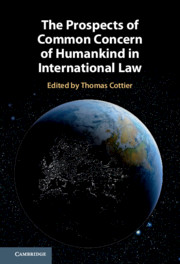Book contents
- The Prospects of Common Concern of Humankind in International Law
- The Prospects of Common Concern of Humankind in International Law
- Copyright page
- Contents
- Figures
- Contributors
- Preface
- Acknowledgements
- Abbreviations
- Part I Theory
- Part II Case Studies
- 2 Trade-Related Measures to Spread Low-Carbon Technologies
- 3 Marine Plastic Pollution as a Common Concern of Humankind
- 4 Exploring the Recognition of New Common Concerns of Humankind
- 5 Reshaping the Law of Economic Sanctions for Human Rights Enforcement
- 6 Migration as a Common Concern of Humankind
- 7 International Monetary Stability as a Common Concern of Humankind
- 8 Financial Stability as a Common Concern of Humankind
- Part III Epilogue
- Index
- References
3 - Marine Plastic Pollution as a Common Concern of Humankind
from Part II - Case Studies
Published online by Cambridge University Press: 04 May 2021
- The Prospects of Common Concern of Humankind in International Law
- The Prospects of Common Concern of Humankind in International Law
- Copyright page
- Contents
- Figures
- Contributors
- Preface
- Acknowledgements
- Abbreviations
- Part I Theory
- Part II Case Studies
- 2 Trade-Related Measures to Spread Low-Carbon Technologies
- 3 Marine Plastic Pollution as a Common Concern of Humankind
- 4 Exploring the Recognition of New Common Concerns of Humankind
- 5 Reshaping the Law of Economic Sanctions for Human Rights Enforcement
- 6 Migration as a Common Concern of Humankind
- 7 International Monetary Stability as a Common Concern of Humankind
- 8 Financial Stability as a Common Concern of Humankind
- Part III Epilogue
- Index
- References
Summary
Massive accumulation of marine litter is internationally recognized as one of the most pressing environmental concerns of our time. The chapter shows that there is a process underway towards recognition of marine litter, and marine plastic pollution in particular, as a common concern of humankind. It identifies existing general obligations in the subject area, which largely correlate with the pillars of the doctrine as discussed in this book. The chapter explores the potentials of the doctrine of common concern to further reinforce global efforts to mitigate marine plastic pollution. It argues that the recognition of marine plastic pollution as a common concern of humankind urges states to cooperate more closely and calls for the establishment of a specific legal framework on marine plastics, including from land-based pollution sources. In a legal binding instrument, standards can be set regarding national implementation.
Keywords
- Type
- Chapter
- Information
- Publisher: Cambridge University PressPrint publication year: 2021
References
Select Bibliography
- 1
- Cited by



